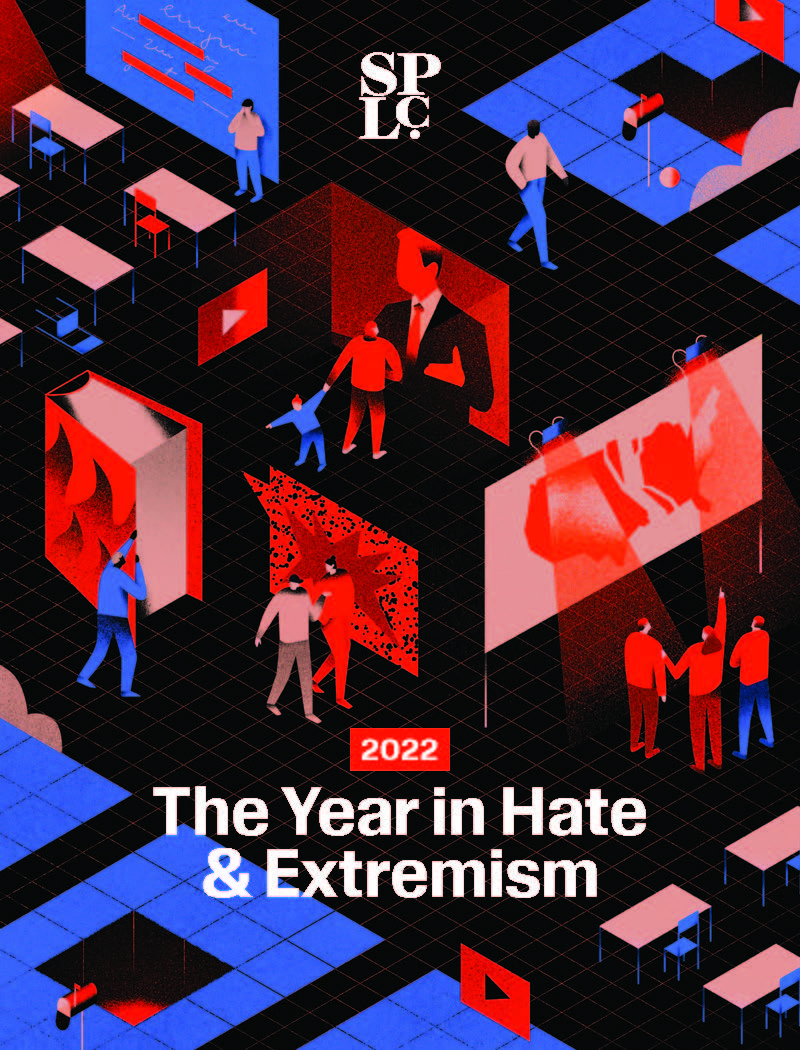Year in Hate & Extremism report details dangerous link to legitimated political power
On Jan. 6, 2021, we all saw one of the most harrowing displays of hate and extremism we will see in our lifetimes. Some good news — since then, the number of active militias in the United States has declined from 92 to 61 because of enforcement actions against the organizers. This is just one of the things you will learn in our nationally recognized Year in Hate & Extremism report, which we have released annually since 1990.
I hope you’ll take a moment to read this year’s report and forward it to your friends.
On that January day, as extremists stormed the Capitol, their behavior was indulged by right-wing politicians at the highest level of power. That is something you will learn in this report as well, the bad news — that while extremist militias have declined, the strength of hateful extremist groups, the number of their public displays and their grip on political power grows in alliance with elected right-wing politicians.
This is a highly concerning development. The marriage of extremism and legitimated political power is dangerous. It is something that all responsible democratic citizens should remain alert to.
Our report is nationally recognized as one important barometer of the level of hate and antigovernment extremist activity in the country. We put it together through persistent research and data collection, public polling, social media analysis, investigative reporting and expert insights.
Each and every American should remain aware of what we have uncovered in this report, because while the number of active militias has in fact declined, other forms of hate remain as virulent and well-organized as ever.
Here is what you need to know from our report:
- White nationalist Patriot Front, neo-Nazi National Socialist Club (NSC-131), and neo-fascist Proud Boys performed the most hate spectacles in 2022 — and groups like these have increasingly built demonstrations that follow the path of elected, far-right members of the GOP, dangerously tying extremism to political power.
- Public figures, including celebrities and politicians, have made antisemitic statements that help mainstream and normalize antisemitism from the extremist fringes, which leads to real harm in the Jewish community.
- The deadly attack on the Black community in Buffalo, New York, in 2022 was motivated by the “great replacement” theory, a false hard-right conspiracy theory that suggests a systematic, global effort to replace white European people.
- The Proud Boys targeted more than 40 local LGBTQ+ events in 2022, while state legislatures introduced 300+ anti-LGBTQ+ laws.
- And this year, for the first time, we are designating reactionary anti-student inclusion groups, like Moms for Liberty, as an anti-government extremist group. A consistent tactic of these groups has been to attack public education and attempt to ban books from classrooms and libraries based on what they deem inappropriate – because the content addresses race, LGBTQ issues or gender.
This is just a small selection of what you and the people you tell about it can learn from the report, which you can find here. But just as important as these concerning trends, you will learn about the fierce efforts to push back against them.
- The Biden administration released the first-ever U.S. national strategy to counter antisemitism.
- SOJOURN, an Atlanta-based nonprofit, has become a hub for regional and national collaboration through its partnership with Keshet to counter hate and build inclusive spaces.
- The SPLC and the Polarization and Extremism Research and Innovation Lab (PERIL) are leading community-focused efforts to address youth radicalization toward extremism and violence.
For that is always the answer to hate — resistance from people of conscience, from the Biden administration, from us at the SPLC, from our supporters. Together, we will resist this effort, which has dangerously linked extremism with political power in a way not seen before in modern American history.
Consider that in 2022, 99 candidates with apparent ties to extremist groups ran for office. While most thankfully lost, 23 still succeeded in safe, right-leaning districts.
That is why our effort to combat hate and extremism is not limited to the items noted above. It must include voting rights advocacy and democracy protection, because extremism has reached an unprecedented nexus with political power.
Our federal policy team is ready to combat hate and extremism wherever and whenever it arises, whether in fringe demonstrations, the statements of celebrities or from elected officials. We have seen in 2022 that extremists are dangerously grasping for political power either by allying with far-right elected officials or directly winning office.
We have seen progress — recall that the number of active militias has declined since the Jan. 6 insurrection — but progress also requires each of us to act. By reading this report, we are all taking an important step forward.
Illustration at top by Kasia Bojanowska





